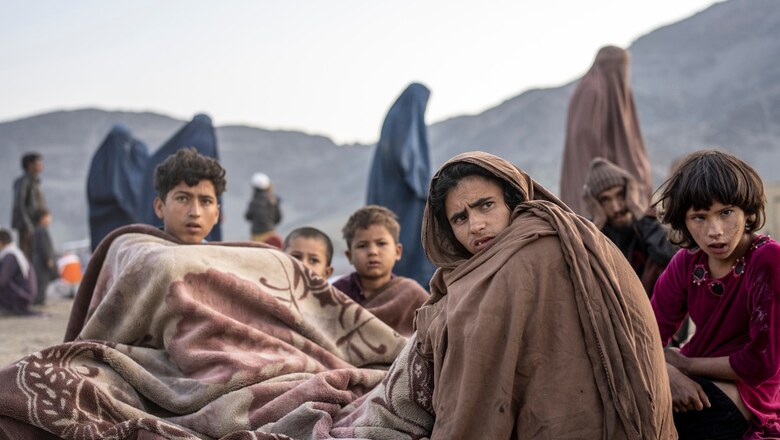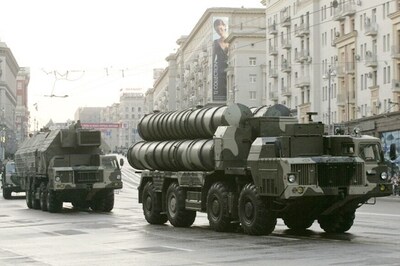
views
At a time when the world is busy dealing with crises in Ukraine and Palestine, Pakistan’s all-powerful security establishment has created one of the worst humanitarian crises in the region. It is using the caretaker government to expel millions of Afghans living in various parts of Pakistan. Owing to the rugged terrain, porous border and strong ethnic bond across the Durand Line, Pakistan has historically been a preferred destination for Afghans during any crisis they would face.
The mass exodus, which started after the Soviet invasion in 1979, did not stop completely owing to the continued instability and insecurity in Afghanistan. Be it the post-Soviet civil war, the emergence of Mullah Omar’s Taliban, America’s war on terror or the re-emergence of Taliban under Hibatullah Akhundzada, poor Afghans continued to cross the Durand Line to save their lives. With Pakistan threatening to forcefully deport ‘illegal’/undocumented people living in the country beyond November 1, 2023, around 200,000 Afghans are being pushed back to Taliban-ruled Afghanistan. There are around 4 million Afghans in Pakistan, of whom, only 1.4 million have some form of formal registration.
Although the government is talking about targeting only those having no formal documents, caretaker interior minister Sarfaraz Bugti on November 1, in a TV talk show, underlined that even registered Afghans would be sent back to their country, but in the first phase, the government was focusing only on ‘aliens’ with no formal documentation or travel history.
In another talk show on November 3, he stated that Pakistan has had shared ‘bread-butter and social fabric’ with these Afghans for the past four decades. These people came here during the war and now they should go back as there is no war now, he said. Contrary to these claims, there are reports of the security forces targeting even those who have legal documents. A BBC report mentions the plight of Abdullah’s 22 family members who were forced to leave despite having Afghan Citizen Cards and IDs issued by Pakistan.
Due to a number of reasons, public reaction over the issue is largely subdued in the country. However, people in general and human rights activists in particular have opposed the move. A number of political leaders and activists have approached the Supreme Court and challenged ‘mass deportation’ of Afghan refugees and asylum seekers by the caretaker government. As far as the mainstream political parties are concerned, Jamiat-ul-Ulema-e-Islam-Fazlur (JUI-F), and Pakistan Muslim League (N) are openly airing their concerns, whereas PPP is taking a balanced approach.
Maulana Fazlur Rahman of JUI-F is opposed to the deportation by force. To him, the issue of Afghans living in Pakistan is a bilateral issue between Pakistan and Afghanistan and it should be resolved amicably through dialogue. He underlined the fact that in the name of deporting ‘illegal’ people, even the Afghans residing legally in Pakistan are also being targeted, harassed and blackmailed. He has alleged that such inhuman and merciless approach has been adopted to occupy their land and other belongings. He is of the view that the government should take Afghan Taliban into confidence and find out a way out.
On November 1, PML-N leader and Senator Mushahid Hussain Syed in a TV talk-show termed the policy of forceful deportation as arbitrary and not part of a well-thought-out plan. He was of the view that at a time when Pakistan does not enjoy good relationship with Afghan Taliban and Pakistani Taliban is making a forceful comeback, it could create a new Muktibahini like situation (that led to the creation of Bangladesh). It is important to note that majority to those being targeted are Pashtuns who enjoy brotherly ties within the Pashtun community of Pakistan. If not addressed properly, the issue could go out of control, as cautioned by the PML-N Senator.
Not very long ago, Pakistan used to boast proudly about hosting a large number of Afghan refugees documented or otherwise. Why has there been a sudden change of heart? One can find at least four prominent reasons that could have led Pakistan to change its approach.
Firstly, the resurgence of Tehreek-e-Taliban Pakistan (TTP) has put the security establishment in a tight spot. Ever since Taliban 2.0 came to dominate the State of Afghanistan (from August 2021), TTP is pushing aggressively for an Afghan-Taliban style regime in Pakistan. It has remodeled itself from a ragtag militia to a far more organised group with an administrative and operational hierarchical structure like the one adopted by the Taliban in Afghanistan.
The TTP has mounted relentless attacks against the armed forces of Pakistan in Khyber Pakhtunkhwa and elsewhere. Despite repeated requests and threats by Pakistan’s security establishment, Afghan Taliban have refused to help Pakistan rein in the TTP. Zabihullah Mujahid, the official spokesperson of Islamic Emirate of Afghanistan, on 8 November tweeted his statement in which he argued that Afghanistan was not responsible for maintaining peace in Pakistan and instead of blaming Afghanistan, Pakistan should solve its internal problem.
Secondly, a large number of Afghans living in various parts of Pakistan over the years changed the complexion of internal security challenges for Pakistan, especially in the cosmopolitan city of Karachi where migrated Pashtuns are allegedly running transportation businesses as well as organized crime rackets. Their involvement in drug trafficking is also an issue.
In order to deal with the new-found reality, security establishment was looking for ways and opportunities to get rid of these elements. As the caretaker set-up does not have any political constituency and has less accountability than an elected one, Imran Khan’s Pakistan Tehrik-e-Insaf (PTI) is in shambles following the May 9 incident, and other mainstream political parties are trying to enlist establishment’s backing in the upcoming election, the Pakistan Army has found it suitable to target the sections complicating the internal security situation in Pakistan.
Thirdly, Pakistan is facing an economic crunch that could lead to default as the international economic aid has almost dried up after the withdrawal of the United States from Afghanistan. The artificially created humanitarian crisis, by expelling large number of Afghans living in Pakistan, could also be a ploy to convince the international community about the need to commit and dispense international humanitarian aid to Pakistan which may give some temporary respite on economic front.
Fourthly, Pakistan Army is facing a backlash because of its handling of political situation at home. It is an established fact that despite its concerted efforts to write off Imran Khan politically, a substantial chunk of Pakistani population, especially the youth, still favours Imran Khan. The post-May 9 crackdown and imprisonment of Imran Khan, instead of putting a dampener on his popularity has actually increased it.
The newly created issue of forceful deportation might also be a ploy by the Pakistan Army to divert people’s attention from its meddling in the upcoming general elections scheduled in February 2024. However, this has already angered the Pashtuns on both side of the Durand Line and is likely to provide a fillip to TTP’s mobilisation and vengeance. It has also visibly upset the Afghan Taliban. The after-shocks of this tremor, centered around expulsion of the refugees, may not be easy for the Pakistani state to handle.
Dr Ashish Shukla is Associate Fellow at MP-IDSA, New Delhi. Views expressed in the above piece are personal and solely that of the author. They do not necessarily reflect News18’s views.



















Comments
0 comment